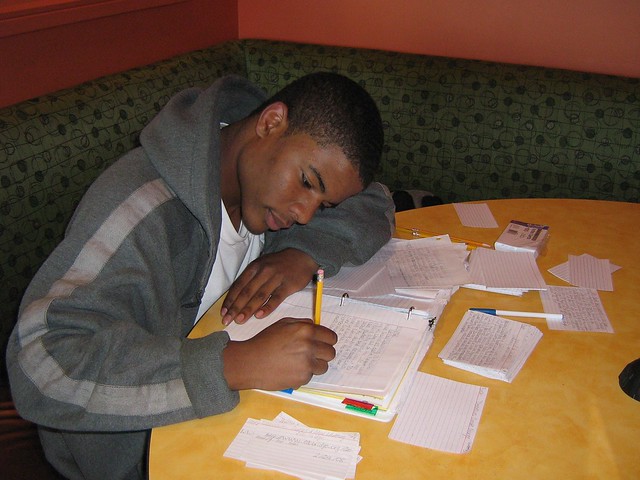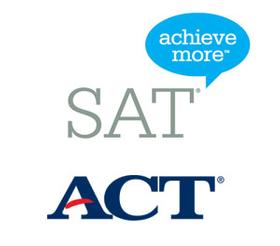Ever wish you could pick the brain of A+ students? Well, we did it for you — we spoke with dozens of students and educators to find out their secrets for success.
Everything they had to say is compiled here. There’s short term techniques to get you started on your way as well as long term tips to maintain your achievements.
Happy studying! And remember — grades aren’t everything. Use them as a tool to measure your learning, not as a goal in and of themselves.
1. Know your learning style.
Different study strategies work better for different people, and knowing your learning style will help you understand which study methods work best for you. Take this 20 question quiz to find out your learning style!
- Aaron Harris, Harvard alum and CEO of Tutorspree
2. Color code your notes.
If you write notes by hand, have a black pen, red pen, blue pen, and green pen handy. If you take notes on the computer be prepared to change the color of the text. When the teacher gets to a number or date you need to remember, write the numbers in red. If your professor throws out an important term or definition, put the term in blue. And if you need to remember places or famous names, put them in green. Everything else, keep in black.
When you study, memorize the important colored words and the “black words” will follow. Then you are able to identify the answer instinctively on the test, since your brain has compartmentalized the important information. This method is ideal for multiple choice and true/false questions, but including dates, statistics, names, and places will also really impress your teacher in an essay.
- Chelsea Corbett, former A student and AmeriCorps Volunteer
3. Start assignments immediately.
Don’t procrastinate. Start as early as possible so you have time to edit and even get the instructor’s opinion. When you start early you allow yourself the time to think about your topic, plan your assignment, and have someone read it or edit the assignment once you are finished.
A second pair of eyes looking at the assignment helps to catch small mistakes, ensures that your argument is clear, and allows you time to consult with your instructor before the due date. It also serves to eliminate stress, since you are not doing things at the last minute.
- Dr. Stephen Jones, Author of Seven Secrets of How to Study
4. Follow the instructions.
If they tell you in the grading rubric that 50% of the grade depends on having 3 different sources, then make sure you have 3 different sources for your paper. Too many people don’t actually follow the instructions.
In college I came up with a system that worked liked this: on the first day of class I took each syllabus and made a chart with all the points that could be accumulated, and I worked on each assignment to maximize points. By the time I got to the final, I could’ve scored a 50 and still gotten an A. Plus, because I’d done everything right up until that point, the chance of me scoring a 50 on the final was almost nil. It made finals really stress-free.
- Erin Von Bergen, former A student and Marketing Director at VidioVibe
5. Break tasks down into manageable chunks.
Differentiating and categorizing information is very helpful for retention. If you need to memorize a lot of material, make a memory tree. Draw 3 branches for main topics, then make smaller branches for subtopics. This organizes the information in a nice visual that is easier for your mind to process and understand.
Another tip is to use colored flashcards and use the different colors to create categories. It also allows you to study smaller chunks: rather than trying to tackle 100 cards at once, you start with 30, and then move to another topic when you have mastered one group.
With a term paper make an outline. For example, break down a 10-page paper into three main topics, then have 3 subtopics within each main topic. This creates an easy place to start; you can do one subtopic per page, and it is much more manageable than trying to write ten pages all at once.
- Dr. Stephen Jones, Author of Seven Secrets of How to Study
6. Use technology to help you focus.
In the age of technology it’s easy to get sidetracked on Facebook, Youtube, email, etc. It is important to stay focused and work. When kids are younger their parents police them, but once we are older we need to learn to police ourselves. As much as technology can be a distraction, it can also be helpful.
There are now applications that can block or monitor your use of certain sites like Facebook, etc. One is called Stayfocused; you install the application on Google Chrome, set the amount of time you plan to spend on distracting sites each day, and it blocks the page once your time’s up.
Another great application is keepmeout, which sends you warnings once you have used the time you allotted yourself on each site.
- Meredith Hafer, Greenwich Education Group.
7. Find an environment with few distractions.
For me, achieving academic success was not simply a matter of studying harder — it was about using my study time more efficiently.
I found it beneficial to get out of the house to study. My favorite destinations were Starbucks and Panera, both of which have free WiFi and a comfortable working environment. However, this might not be the best environment for you. Figure out where you work most effectively and get your butt over there to study!
- Cameron Booth, graduating summa cum laude from UC Riverside
8. Study smart not hard.
Online resources like Quizlet (a flashcard website with a database of study materials) and Wolfram Alpha (an extremely powerful calculator for technical courses) help streamline your studying process and make the most of your time.
Also take a look at our list of 15 Must-Have Apps for Finals. They’re useful all year-round!
- Cameron Booth, who is graduating summa cum laude from University of California, Riverside.
9. Ask your teacher or professor.
Students who seek out the teacher with their questions do better than their peers who don’t. Not only do students who do so get their questions answered, but they build a relationship with the teacher. That makes a difference. A teacher is more likely to round up and cut a student slack if they show the teacher the class is important to them.
This also means any confusing concepts are clarified before you go home to do the assignment, which saves you a lot of frustration.
- Sophia Martin, H.S. Social Studies Teacher & Author of the Veronica Barry Mystery Series.
10. Know when to quit. If one thing isn’t working, try something else.
There is no need to continually bang your head against the wall. If you don’t understand something by looking at an example in the book, look for another example online. If your teacher’s explanations don’t make any sense to you, try watching a Khan Academy video.
If you are still confused ask a parent, a teacher, or call a tutor. At Tutorspree we can set you up with the perfect tutor, so never hesitate to give us a call!
- Aaron Harris, Harvard alum and CEO of Tutorspree
11. Tutor others. If you can teach it to others, then you really know it.
Tutoring other people helps you to master your subject and become an expert. When a student asks you a question you are challenged to demonstrate your knowledge and think in different ways. Sometimes a question is raised where you don’t know the answer. This allows you to research it further and develop a deeper understanding of the subject.
- Dr. Stephen Jones, Author of Seven Secrets of How to Study.
12. Read efficiently and strategically.
Often the amount of reading assigned in History or English classes in college would take more hours than there are in a day! Talk to TAs and professors, find out which reading requirements are more important, and spend more time on those.
When you read, skim the headlines and bullet points to get a sense of the most important ideas. Introductory and conclusion paragraphs, as well as the first sentence of each paragraph, also tend to contain the most crucial information. If you don’t have time to read everything, skimming is infinitely better than not doing the reading at all.
- Enhao Li, Founder of Doteable
13. Know when to use a study group.
Study groups are awesome to divide notes, get help from other people, and more fun than studying alone. A study partner is helpful even when you are working on different subjects. You can motivate each other and hold each other accountable when you make plans to study together.
- Enhao Li, Founder of Doteable
14. Build confidence.
This is especially important for younger kids, and is an area where parents must be proactive. Kids love what they are good at; build your child’s confidence by introducing them to subjects early. Sometimes children learn at a different rate than the speed material is taught in the classroom. This can result in a feeling that they are not “good” at a subject like math when the class is simply going a little too fast for them.
Introducing the concept before the child confronts it in school will allow them to be more confident and approach learning with a different, more “can do” attitude, which will allow them to be more successful and open to learning a subject.
- Enhao Li, founder of Doteable
15. Set high standards and find an internal source of motivation.
I make A’s not for my parents or peers or professors. I exceed academically because I want to make myself proud. Just to know that I have succeeded in yet another semester of college proves that the sky is the limit.
- Carmen Nicholson, A student at Albany State University
16. Establish a routine that works for you.
As a student it is important to recognize that you need a routine that works for you, not your parents or your peers. Some people are early birds, while others are night owls. In high school you have less control over when you study and when you take class, but in college you generally have the freedom to create a schedule that is ideal for you. Self-knowledge is the key to success.
- Meredith Hafer of the Greenwich Education Group.
17. Don’t try to do too much and always make time for the things you love.
Yes squeezing in that extra AP seems important, but students need to make sure they don’t burn themselves out or lose perspective. Make sure they make time for things in their life that they love, whether that is riding horses, playing soccer, or simply hanging out with friends. College and high school are about the long haul, it is important to feed your passions and your soul or you won’t make it.
- Meredith Hafer of the Greenwich Education Group.
18. Network with practicing professionals.
It is important for students to keep their eye on the prize, which is to have a successful career and life. In order to do this, students need to get out and see what they are working towards. Thinking about their end goal gives them perspective, motivation, and insight into subject matter. This does not end with college, it’s about their future, and if they can see that future more clearly, they will be more motivated.
- Meredith Hafer of the Greenwich Education Group.
19. Learn to write well.
Writing is important, not only for academic success, but also for success in a career. The primary mode of communication in today’s world is email, which means being a good writer is essential to professional correspondence. If you are looking to improve your writing, there are a lot of great resources on the internet, such as the University of Richmond’s Writer’s Web or Purdue University’s OWL(online writing lab).
- Meredith Hafer of the Greenwich Education Group.
20. Read for fun, not just for school.
The more you can develop your reading and comprehension skills, the easier you’re studying will be, since you will learn more in a shorter period of time. Look at ”How to Read More Books—Benefits of Reading for more information.
Also check out our summer reading series, starting with 7 Great Books to Read Before 7th Grade.
- Carly Stewart, Contributor at Money Crashers Personal Finance.
21. Keep learning over the summer- Summer is a long time, it is important for kids to have fun, but they should also spend some of their time learning. The brain is like a muscle; it is important to keep exercising it! Get the textbooks for next year early, and encourage your kids to spend time flipping through them over the summer. Then when they studythe concepts in school, it is not the first time they see them. Spend part of your summer investing time in your education.
- Enhao Li, Founder of Doteable
Julia Zhou is the Director of Customer Acquisition at Tutorspree an online service that matches students with their perfect tutors. She graduated from the University of Pennsylvania with majors in Economics and Political Science. As a part-time tutor for over five years, she has worked with students at a variety of top private schools including Horace Mann, the Trinity School .and Hotchkiss.

























































-4c3194pi4wis8gsg004w0g44w-280.jpg)


